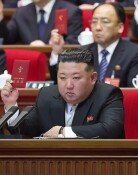Exporter Korea Sways from Foreign Shockwaves
Exporter Korea Sways from Foreign Shockwaves
Posted April. 18, 2005 23:38,
The KOSPI closed at 925.00 after falling 22.22 points (2.35 percent). KOSDAQ also dropped 19.35 points (4.30 percent), and closed at 429.73 points.
The fall in the Asian stock markets started due to the fall in the NYSE. The Dow Jones Industrial Index dropped 191.24 points (1.86 percent), and NASDAQ fell 38.56 points (1.98 percent) on April 15.
The main reason for the simultaneous drops in the worlds stock markets is that it seems the U.S. economy, which has been solely leading the world economy, will have a hard landing due to the rise in interest rates.
The U.S. trade deficit was an unexpectedly high $61 billion, and Aprils consumer confidence index recorded 88.7, which was lower than expected (89.3). Major U.S. companies earnings for the first quarter (January~March) also did not meet expectations.
SERIs director Kim Gyung-won stated, Early this year, the U.S. was expected to grow without inflation, but now there are questions of whether the U.S. economy has hit a soft patch (when the economy improves, and then momentarily has a recession) or whether they are in a recession.
The imbalance in the world economy is mainly due to the U.S. twin deficits (current account deficit and budget deficit). However, because each country has different interests, it has been difficult to find a solution.
China did not attend the G7 meeting due to its dissatisfaction over the pressures related to the appreciation of the yuan. There is a possibility that this economic conflict will extend into the political areas between U.S. and China.
Moreover, oil prices have been rising again this year, putting pressure on the world economy.
BOKs head researcher, Kim Jae-cheon explained, The uncertainties in the world economy are not yet directly affecting Korea, but this is the first time since the economic crisis that all outside factors, such as exchange rates, oil prices, and the world economy, have all taken a downturn. The Korean capital market is completely open, and foreign investment in the stock market has increased. The impact on the Korean economy could amplify if the outside factors are even a little unstable.







